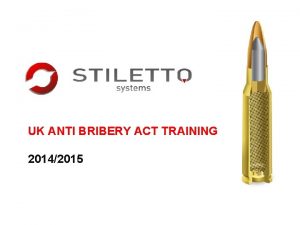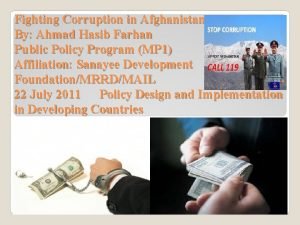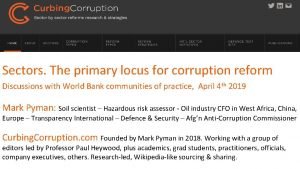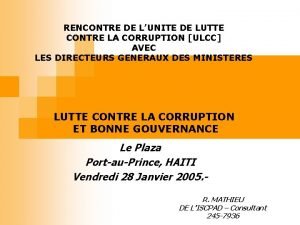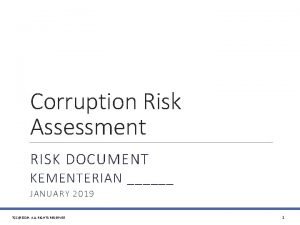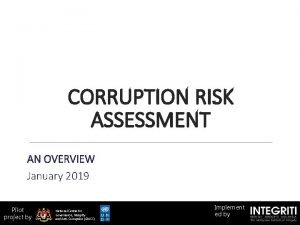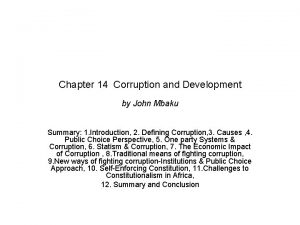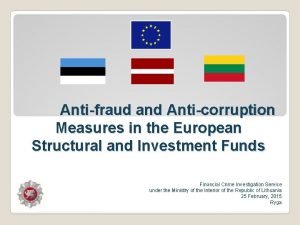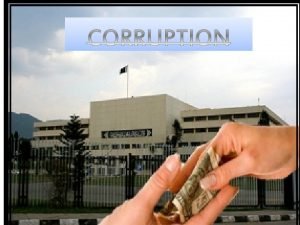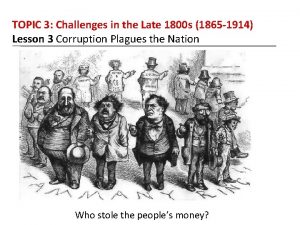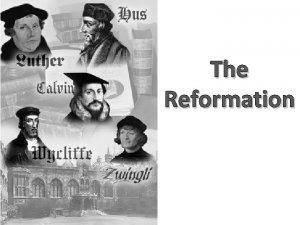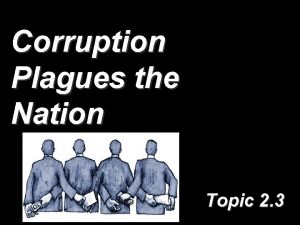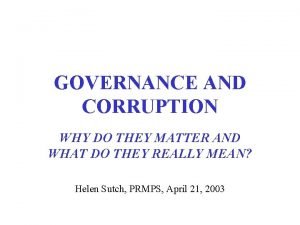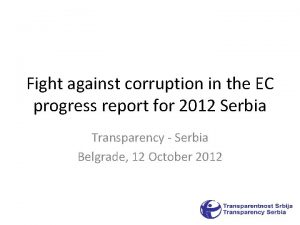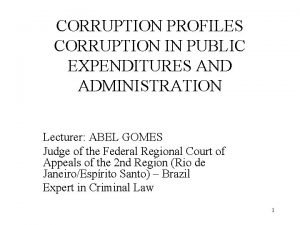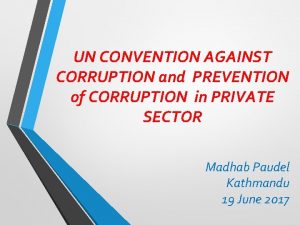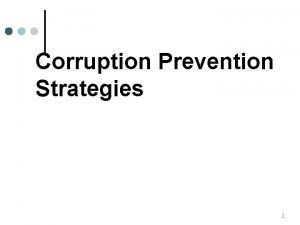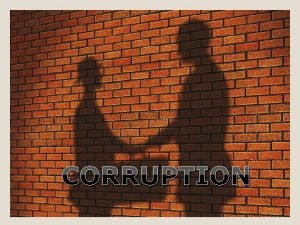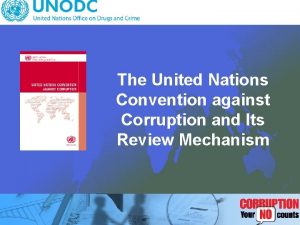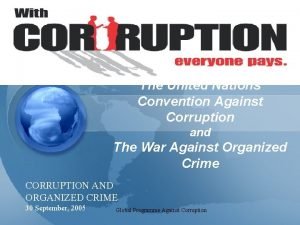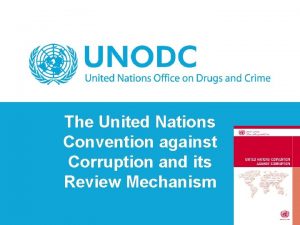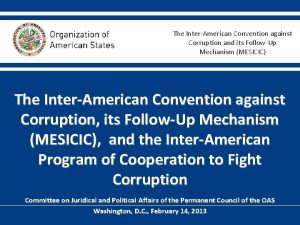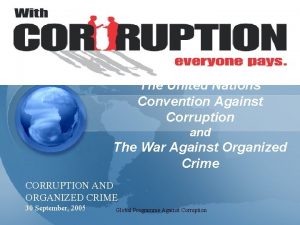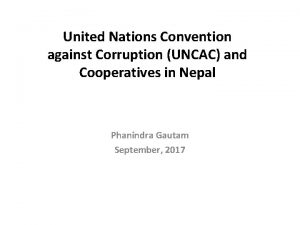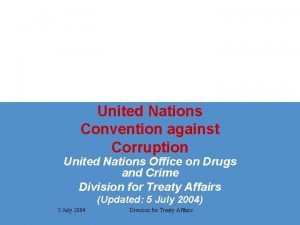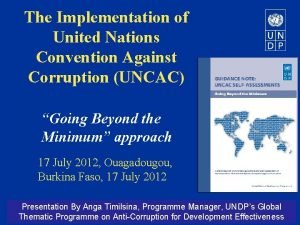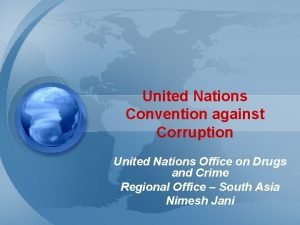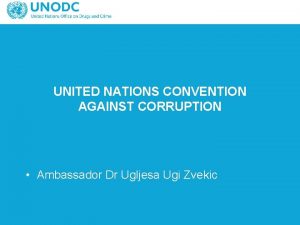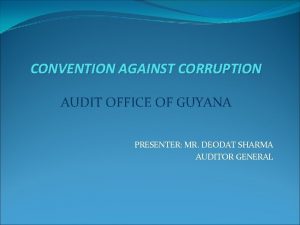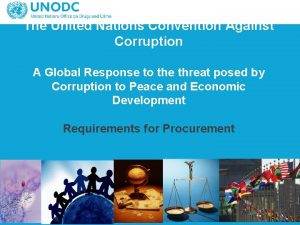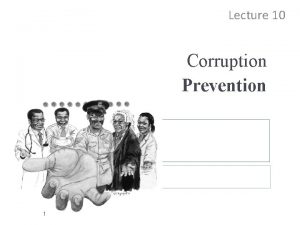UN CONVENTION AGAINST CORRUPTION and PREVENTION of CORRUPTION
























- Slides: 24

UN CONVENTION AGAINST CORRUPTION and PREVENTION of CORRUPTION in PRIVATE SECTOR including COOPERATIVE ORGANIZATIONS Madhab Paudel Kathmandu 18 September 2017

• • What is the United Nations Convention against Corruption ? (UNCAC) United Nations Convention against Corruption (UNCAC) is a multilateral treaty in the field of crime control adopted by UN GA in October, 2003, UNCAC: is a landmark international legal instrument designed against corruption UNCAC: provides a remarkable achievement in corruption control field UNCAC : a global instrument to response to a global problem, UNCAC: addresses the cross boarder nature of corruption, UNCAC: is an unique legal instrument applicable worldwide and also provides both preventive and punitive legal measures, UNCAC: provides a mechanism to the state parties to help to each other to prevent and combat corruption through technical cooperation, UNCAC: also encourages the participation of citizens and civic societies in accountability process and underlines the importance of citizens access to information to ensure transparency.

UN Convention against Corruption (UNCAC) and its Genesis • UNGA, by a Resolution No. 55/61 adopted on Dec. 4, 2000, formed an ad hoc committee to prepare drafts articles of an universal convention to address corruption, • Thereafter, an open ended experts Group was formed, • The meeting of the said Group was held in Vienna in 2001, • The Group recommended UNGA to prepare universal comprehensive convention and open ended committee was formed in 2001, • Ad hoc committee started negotiations from Jan. 21, 2002 in Vienna, • After seven rounds negotiations, ad hoc committee finalized the draft of UN Convention against Corruption on October 31, 2003

UNCAC at a Glance • The text of UNCAC was adopted by UNGA on Oct. 31, 2003 by a resolution, • By another resolution on the same day UNGA urged member states to observe Dec. 9 as the anti-corruption day, • UNCAC was opened for signature by member states from Dec. 9 -11, 2003 in Merida, Mexico and thereafter, in New York till Dec. 2005, • Total number of signatory states are 140, • Nepal signed UNCAC on Dec. 10, 2003, • Total number of state parties 181 ( as of September, 2017), • UNCAC came into force on Dec. 14, 2005 in accordance with Art. 68. 1 to UNCAC, • Nepal ratified UNCAC of March 31, 2011, • UNCAC entered into force for Nepal on April 30, 2011.

Major Provisions of UNCAC • In addition to general provisions and final provisions UNCAC provides followings chapters: 1. 2. 3. 4. 5. 6. • 1. 2. 3. Preventive measures (chapter 2) Criminalization and law enforcement (3) International co-operation (4) Asset recovery (5) Technical assistance and information exchange (6) Mechanism for implementation (7) Three types of obligations under UNCAC: Mandatory Less mandatory Optional

State Obligations Under UNCAC • Preventive measures: • UNCAC identifies 3 areas where corruption may be committed(public sector , private sector and political parties). • State has to ensure rule of law, transparency, accountability and good governance in public sectors. • Ensure corporate governance and enhance accounting auditing standards. • State has to criminalize various acts as corruption(bribery, embezzlement , trading in influence , abuse of function, illicit enrichment , money laundering , concealment of property , obstruction of justice etc. • Co-operation in the field of extradition, transfer of offenders , mutual legal assistance in regard to evidence, documents and proceedings and joint investigations. • Asset recovery to repatriate the assets in the Country of origin where corruption was committed.

Special Provisions in regard to Private Sector ( Applicable Basically Private Sector including Cooperative organizations) • Preventive Measures(chapter 2) Measures to be adopted particularly to regulate private sector (Art. 12), Criminalization and Law Enforcement (chapter 3): • Criminalization the acts of bribery in private sector (Art. 21), • Criminalization the acts of embezzlement of property and funds in private sector (Art. 22), • Criminalization the acts of money laundering (Art. 23), • Criminalization the acts of concealment of property (24), • Liability of Legal persons (26),

Measures to be adopted to regulate private sector ( Art. 12) , • 1. State Party has to enhance accounting and audit standards and adopt other measures, particularly, in private Sector: • Safeguard integrity , develop code of conduct for correct, honorable and proper performance, • Prevent conflict of interests, • Promote good commercial practices, • Promote transparency , • Prevent misuse of procedures including regarding subsidies and licenses, • Prevent conflict of interest and impose restriction of professional activities of former public officials , • Ensure sufficient internal auditing controls to prevent and detect acts of corruption,

• Measures to be adopted to regulate private sector ( Art. 12) , 2. State Party has to take necessary measures to maintain books of records, financial statements disclosures , accounting and auditing standards to prohibit following acts: • • • Establishment of off-the –books accounts, Making of off –the-books or inadequately identified transactions, Recording of non-existent expenditures, Entry of liabilities with incorrect identification of their objects, Use of false documents, Intentional destruction of bookkeeping documents earlier than foreseen by law. • 3. Disallowance tax deductibility of expenses that constitute bribe and other expenses incurred of corrupt conduct.

Measures to be adopted to prevent Money laundering (Art. 14) • 1. State Party has to institute a comprehensive domestic regulatory framework and supervisory regime for banking and non-banking financial institutions including natural persons that provide formal or informal service for transmission of money or value, • Other bodies to deter and detect all forms of money laundering, • Regime shall requires the customers and beneficial owner identification , record-keeping and reporting of suspicious transaction, • Administrative, regulatory and law enforcement and other authorities dedicated to combating money laundering have the ability to collect, cooperate and exchange information in national or international level, • Establishment of a financial intelligence unit to serve as national center for collection, analysis and dissemination of potential money laundering

Measures to be adopted to prevent Money laundering (Art. 14) • 2. State Party has to implement feasible measures to detect and monitor the movement of cash and negotiable instruments across the boarders, • 3. State Party shall require the reporting of cross-boarder transfer of substantial quantities of cash and negotiable instruments, • 4. State Party shall require financial institutions including money remitters: • To include on forms for electronic transfer of funds accurate and meaningful information on the originator, • • To maintain such information throughout the payment chain, To apply enhanced scrutiny to transfer of funds that do not contain complete information on the originator.

• Liability of legal persons Corporations / Companies/ Cooperative Organizations have separate personality known as “legal/ corporate personality” different from their promoters/members/shareholders, • Corporate personality does not turn them into real human beings, • Under the classical jurisprudence , Corporations /Companies/Cooperatives ought not to be subject to the criminal law because they do not have mental states and cannot be guilty, • If a crime is committed by or within the corporation , the corporation veil shall be lifted and the person who commits actually the crime shall be liable, • Potential criminal liability of legal person is an accepted part of jurisprudence in many jurisdictions of common law system,

Liability of legal persons • In many civil law countries, traditionally, corporations/ companies are excluded from the criminal liability, • • In Italy and Germany constitutional provisions precluding guilty of corporations, Similar provisions are applicable in Poland , Belgium and other European countries, • In 1992 French Penal Code, 1970 Netherlands, Mexico, Columbia and other countries, • Liability of legal persons for participation in the serious offenses involving organized crime(Art. 10) • Possible penalties for legal persons : heavy fines, exclusion from government procurement, court supervision, blacklisting, deregistration or liquidation of the corporation

Meaning of corruption under Nepali Legal System • Corruption is defined as a crime committed in public • sector and normally by the public officials, Prevention of Corruption Act, 2059 defines corruption as crime punishable under its chapter 2, namely: • • • Taking by or rendering to public servant any gratification, Accepting without price or in lesser price any goods or service by any public servant from a person who is concerned with the public duty, Accepting reward, gift or donation by a public servant, Accepting commission by a public servant, Committing leakage of public revenue by a public servant, Committing intentionally illegal benefits or loss by a public servant,

Meaning of corruption under Nepali Legal System • Preparing fake documents or fake translation, destroying public documents , disclosing confidentiality of question or result of any examination, or preparing a fake report by a public servant, • Transaction of any business by a public servant that is restricted to conduct by him/her, • Submitting fake certificate to hold a public service, • Embezzlement or loss of public property by a public servant, • Committing illicit enrichment by a public servant, • Abetment to commit any offence as defined above

1. Preparation made by Nepal in order to domesticate UNCAC Provisions Meaning of Domestication of International law: transfer of international law in national law 2. A task force was formed by GON on April 2004(2061/1/14) 3. Task force prepared a report and recommended GON to ratify UNCAC as early as possible. 4. Task force recommended to implement UNCAC: 1. In case of mandatory provisions within the period under Art. 68. 2 to UNCAC, 2. In case of less mandatory provisions within a period of 5 years after ratification , 3. In case of optional provisions within appropriate and reasonable period , as determines by GON, 5. Task force recommended GON to enact some new acts , to amend some existing laws, to reform some policies and institutional capacities and to extend international co-operation in certain areas.

Progress Achieved to Implement UNCAC in National Level 1. Some new Acts have already been enacted (out of 14) (PMLA, Insolvency, Good governance , competition protection, public procurement acts etc. and MLA Act, Extradition Act. 2. Some existing laws are already amended (Companies, securities, audits, and BAFIA etc. ) 3. Some laws are under consideration by GON (Organized crimes already done ) Criminal liability of legal person , 4. Some institutions have , already , been set-up (FIU, MLPD, Information Commission etc. ) 5. Some policies have been reformed (anti corruption strategy , money laundering strategy , citizen charter, various code of conducts in public sector etc).

Enactment of New Acts to Domesticate UNCAC • Some new acts have already been enacted: • Prevention of Money Laundering Act, 2007, • Bank and Financial Institutions act, 2006, ( 2017) • Insolvency Act, 2006, • Good Governance Act, 2007 , • Competition Promotion and Market Protection Act, 2006 • Public Procurement Act, 2006, • Mutual Legal Assistance Act, 2015 • Prevention of Organized Crime Act, 2015, • Banking Offences and Punishment Act, 2008,

Amendment of Existing Acts in the line of UNCAC • Certain existing laws are already amended : • Companies Act, 2006 • Securities Act, 2006, • Army Act, 2006 • Extradition Act, 2015, • Certain Bills are before the Parliament. • Audit Act , 1992 • Cooperatives Act, 1992

Policy Reform and Institutional Capacity Reform • Some new policies have been introduced: • • • Anti corruption strategy, Anti Money Laundering Strategy , Citizen Charters, Various Directives issued by the Regulatory authorities, Various Professional Codes of Conducts applicable to public sector officials etc. • Certain new • • institutions have been set-up: Financial Intelligence Unit (FIU) within NRB, Money Laundering Prevention Department, National Information Commission, Public Procurement Monitoring Office,

Challenges ahead to meet UNCAC standards in National Level 1. Prevention of corruption in private sectors ( to define, to prevent and to criminalize) 2. Regulation of political party fund (to disclose origin and destination of funds) 3. 4. 5. Criminal liability of a legal person in general terms, 6. 7. 8. Mechanism for asset recovery , Compensation for damage to a victim suffered by corruption, Some new laws to be enacted (witness and victim protection , whistleblowers protection , offering or giving bribery to a foreign public official etc. ) International co-operation to implement UNCAC. Improvement of weak law enforcement situation of the country

Problems to Implement UNCAC: Private Sector prospective • Under law of Nepal, Corruption is defined only in public sector and is considered as a part of public affairs/ public administration, • Acts of bribery in private sector is not defined as corruption and such acts are treated otherwise, • UNCAC provisions in regard to criminalization of acts of bribery in private sector is less mandatory/less binding, • CIAA, anti-corruption body, is responsible to investigate corruption in public sector.

Recommendations: Private Sector prospective • • • To review , amend and up-to-date the existing laws dealing with the private sector to prevent corruption, To criminalized acts of bribery as corruption in private sector, To establish time framework to define the corruption in private sector: • • • In first phase, Banking and Insurance Companies, (Saving and Credit Cooperative Organizations) In second phase, other Public Limited Companies , In third phase, other companies and business organizations including Cooperative Organizations. To create a competent, independent and autonomous statutory body responsible for investigation and prosecution of corruption in private sector or to empower CIAA to investigate and prosecute it, To establish jurisdiction of the court that adjudicates the acts of corruption in private sector, Create strong alliance of Public sector, private sector and civic society officials to combat corruption.

THANK YOU!
 Primary prevention secondary prevention tertiary prevention
Primary prevention secondary prevention tertiary prevention Fraud and corruption analaytics
Fraud and corruption analaytics Uk bribery act training slides
Uk bribery act training slides Conclusion on corruption
Conclusion on corruption Why is brutus so outraged at official corruption
Why is brutus so outraged at official corruption Locus of corruption
Locus of corruption Corruption conclusion
Corruption conclusion Corruption risk assessment
Corruption risk assessment Corruption risk assessment
Corruption risk assessment Summary of corruption
Summary of corruption Anti-corruption efforts
Anti-corruption efforts The delayed introduction of the great gatsby
The delayed introduction of the great gatsby The great gastby chapter 4 summary
The great gastby chapter 4 summary Corruption causes
Corruption causes Types of coruption
Types of coruption Lesson 3 corruption plagues the nation
Lesson 3 corruption plagues the nation Corruption in the church during the reformation
Corruption in the church during the reformation Corruption plagues the nation
Corruption plagues the nation Corruption in the catholic church
Corruption in the catholic church Ddo combating corruption
Ddo combating corruption Infant development
Infant development Corruption
Corruption Corruption
Corruption Gatsby chapter 3 quotes
Gatsby chapter 3 quotes Corruption essay conclusion
Corruption essay conclusion


